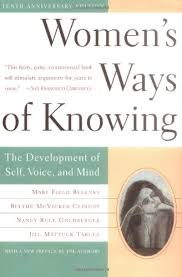Women Police Women
Ever wondered why girls who were forced into sex trafficking become Madams, inflicting the very same cruelty they endured on others? It’s an interesting question; why do the oppressed turn around and oppress?The answer is layered, but Brazilian scholar Paulo Freires’ work, Pedagogy of the Oppressed, which was foundational to future works on oppression, sheds some light.
“A deeper level of silencing occurs through indoctrination. At this stage, the oppressed actually believe that they are “naturally inferior” to the ruling class. They are taught by oppressors that their inferiority is normal and a fact of life. They do not know that they have a voice. In addition, education and literacy are withheld so as to prevent them from gaining knowledge about themselves and stop them from finding means to communicate their thoughts and feelings.” (Italics mine)
Upon reading Freire’s work, I wondered if his findings also could apply to women in conservative faith traditions. Have you ever wondered why women join churches that resist and/or even oppress women? (Many of those women in turn police other women, to ensure the “biblical standard” is upheld.)It seems indoctrination occurs when one class (gender) actually believes that they are inferior. Now I doubt few women and certainly no male pastors would communicate from the pulpit that women are inferior. Today we hear messages like “women and men are of the same essence ‘value’ but differing roles.” This hasn’t always been the traditional view held by the Church. In fact the traditional view states women are inferior to men.For example, in the 13th century, Thomas Aquinas adopted Aristotle’s view that women are defective males—biologically, morally, and intellectually. Hence, he reasoned that only men could fully represent Christ (the perfect human being) in the ministry. (Aristotle taught “the male is by nature superior and the female inferior.”) Unfortunately, when we read most of our church fathers we find they tended to incorporate more of Aristotelian thought than Jesus’s into their view of women.Thankfully the message of inferiority has been softened. Churches rarely teach women are inferior; rather, they teach that’s God’s design (the natural order of things) - equal in essence different in function (roles). But I’m perplexed because when one gender is “by natural order” given the leader roles, the power roles, and the other is not, it sure seems to communicate a message of natural inferiority. You can slice it anyway you want, as my husband said, “Yeah, it’s funny male theologians came to this interpretation and it just happened they are the ones who got the positions of power.” It does have a stink smell to it.Last March I attended a session Religion and Fundamentalism at the UN Commission on the Status of Women. One of their findings was when we dehumanize someone (make a person less than another), they become more expendable. It makes me wonder if this is at play with all that’s happening to women and girls around the globe. Belief in their inferiority means they are “expendable.”This was the same thinking behind the debate on slavery. In 1787, delegates gathered to
Unfortunately, when we read most of our church fathers we find they tended to incorporate more of Aristotelian thought than Jesus’s into their view of women.Thankfully the message of inferiority has been softened. Churches rarely teach women are inferior; rather, they teach that’s God’s design (the natural order of things) - equal in essence different in function (roles). But I’m perplexed because when one gender is “by natural order” given the leader roles, the power roles, and the other is not, it sure seems to communicate a message of natural inferiority. You can slice it anyway you want, as my husband said, “Yeah, it’s funny male theologians came to this interpretation and it just happened they are the ones who got the positions of power.” It does have a stink smell to it.Last March I attended a session Religion and Fundamentalism at the UN Commission on the Status of Women. One of their findings was when we dehumanize someone (make a person less than another), they become more expendable. It makes me wonder if this is at play with all that’s happening to women and girls around the globe. Belief in their inferiority means they are “expendable.”This was the same thinking behind the debate on slavery. In 1787, delegates gathered to  debate slavery. One delegate from South Carolina said, “Religion and humanity have nothing to do with the questions of whether the Constitution should protect slavery – it was simply a question of property rights. The final conclusion was written in the 13th Amendment to the Constitution, blacks would count as 3/5 of a person. (Not quite a full person, less than.)Freire stated,
debate slavery. One delegate from South Carolina said, “Religion and humanity have nothing to do with the questions of whether the Constitution should protect slavery – it was simply a question of property rights. The final conclusion was written in the 13th Amendment to the Constitution, blacks would count as 3/5 of a person. (Not quite a full person, less than.)Freire stated,
A deeper level of silencing occurs through indoctrination. At this stage, the oppressed actually believe that they are “naturally inferior” to the ruling class. They are taught by oppressors that their inferiority is normal and a fact of life. They do not know that they have a voice.
Which leads me to the second part of Freires’ statement:In addition, education and literacy are withheld so as to prevent them from gaining knowledge about themselves and stop them from finding means to communicate their thoughts and feelings. During my doctoral studies, I did some research on how women learn (epistemology). In the book entitled Women's Ways of Knowing, studies indicate that there are five different perspectives through which women view their world and themselves. One of the conclusions was that the majority of church-going conservative women come to know through "received knowledge," one of those five perspectives. Received knowers do not construct their own knowledge—they receive it. They rely on an authoritative source to tell them what is right or wrong. To a received knower, there is only one right interpretation—one right answer—to a problem. Ambiguity or paradox cannot be tolerated. Concepts must be predictable, easily consumed, and clearly laid out.It is important to note that these same studies indicate that received knowers aren't born that way. Their behavior is not innate, but learned. One dramatic result is that, when women are faced with Biblical or theological decisions, they tend to be very uncomfortable with the idea that understanding can take place over time, or that it might require an involved process of reasoning on their part. Trapped in the box of "received knowledge," many women will not read, attend, or participate in anything their authorities have not recommended, for fear it might lead them astray.Again, no woman or pastor would say they “prevent their people from gaining knowledge” – but don’t they? I sat with a young woman who had recently graduated from seminary. She shared the painful experience of having to leave her home church because the senior pastor, preaching on Genesis 1 & 2, stated if you didn’t believe in male headship then you didn’t believe in the Bible. In other words, if you think differently, you have been “lead away.” Her pastor never mentioned that great scholars in his own church tradition disagree with his stance, he never promoted a learning environment to study other interpretations (even in the same church tradition) and he communicated that his way of seeing the Scriptures was “right,” and any other way is “wrong.” This is education withheld. This is preventing knowledge from being learned. This creates received knowers rather than developing our critical thinking skills.It creates further insecurity in women. They think to themselves, “If she’s what the Church images as godly then who am I?” When we compare and compete it divides us and the Bride of Christ limps. And we have women policing each other, making sure women “stay in their place” to ensure the standard party lines are known and adhered to.
During my doctoral studies, I did some research on how women learn (epistemology). In the book entitled Women's Ways of Knowing, studies indicate that there are five different perspectives through which women view their world and themselves. One of the conclusions was that the majority of church-going conservative women come to know through "received knowledge," one of those five perspectives. Received knowers do not construct their own knowledge—they receive it. They rely on an authoritative source to tell them what is right or wrong. To a received knower, there is only one right interpretation—one right answer—to a problem. Ambiguity or paradox cannot be tolerated. Concepts must be predictable, easily consumed, and clearly laid out.It is important to note that these same studies indicate that received knowers aren't born that way. Their behavior is not innate, but learned. One dramatic result is that, when women are faced with Biblical or theological decisions, they tend to be very uncomfortable with the idea that understanding can take place over time, or that it might require an involved process of reasoning on their part. Trapped in the box of "received knowledge," many women will not read, attend, or participate in anything their authorities have not recommended, for fear it might lead them astray.Again, no woman or pastor would say they “prevent their people from gaining knowledge” – but don’t they? I sat with a young woman who had recently graduated from seminary. She shared the painful experience of having to leave her home church because the senior pastor, preaching on Genesis 1 & 2, stated if you didn’t believe in male headship then you didn’t believe in the Bible. In other words, if you think differently, you have been “lead away.” Her pastor never mentioned that great scholars in his own church tradition disagree with his stance, he never promoted a learning environment to study other interpretations (even in the same church tradition) and he communicated that his way of seeing the Scriptures was “right,” and any other way is “wrong.” This is education withheld. This is preventing knowledge from being learned. This creates received knowers rather than developing our critical thinking skills.It creates further insecurity in women. They think to themselves, “If she’s what the Church images as godly then who am I?” When we compare and compete it divides us and the Bride of Christ limps. And we have women policing each other, making sure women “stay in their place” to ensure the standard party lines are known and adhered to. An older woman sat across from me. She wanted to “share some concerns” she had about my teaching. She told me that she represented the older women—“the 1950s women”—in our church. As her comments progressed, she questioned my dress, my hairstyle, and my tendency to roam the stage while I talked. “That’s the way men teach,” she said. In no uncertain terms, she let me know that I was viewed as “aggressive.” She told me that my level of training—and my confidence—was creating tension for other women. She and her friends stayed home and made sure there was breakfast and dinner on the table. She assumed my level of training and job responsibilities precluded me from caring for my family in the same fashion. I didn’t tell her I too cooked breakfast for my kids, packed their school lunches, and cooked dinners from scratch. When women are raised to be received knowers, they hold to their pastor’s teaching as if they are “right” and no other interpretation is valid, in fact any other interpretation is straying from truth. In this kind of Christian environment, women are taught ideas and ideals about what a Christian woman is supposed to be like, and when a woman doesn’t fit into those ideals, we feel unsafe.We police.The reasons why women attend Christian churches that restrict women is layered, but surely the belief that women are naturally designed for the supportive roles, and limited exposure to other theological interpretations (even with in the same church tradition), creates an environment where restrictions on women are policed by other women.
An older woman sat across from me. She wanted to “share some concerns” she had about my teaching. She told me that she represented the older women—“the 1950s women”—in our church. As her comments progressed, she questioned my dress, my hairstyle, and my tendency to roam the stage while I talked. “That’s the way men teach,” she said. In no uncertain terms, she let me know that I was viewed as “aggressive.” She told me that my level of training—and my confidence—was creating tension for other women. She and her friends stayed home and made sure there was breakfast and dinner on the table. She assumed my level of training and job responsibilities precluded me from caring for my family in the same fashion. I didn’t tell her I too cooked breakfast for my kids, packed their school lunches, and cooked dinners from scratch. When women are raised to be received knowers, they hold to their pastor’s teaching as if they are “right” and no other interpretation is valid, in fact any other interpretation is straying from truth. In this kind of Christian environment, women are taught ideas and ideals about what a Christian woman is supposed to be like, and when a woman doesn’t fit into those ideals, we feel unsafe.We police.The reasons why women attend Christian churches that restrict women is layered, but surely the belief that women are naturally designed for the supportive roles, and limited exposure to other theological interpretations (even with in the same church tradition), creates an environment where restrictions on women are policed by other women.

